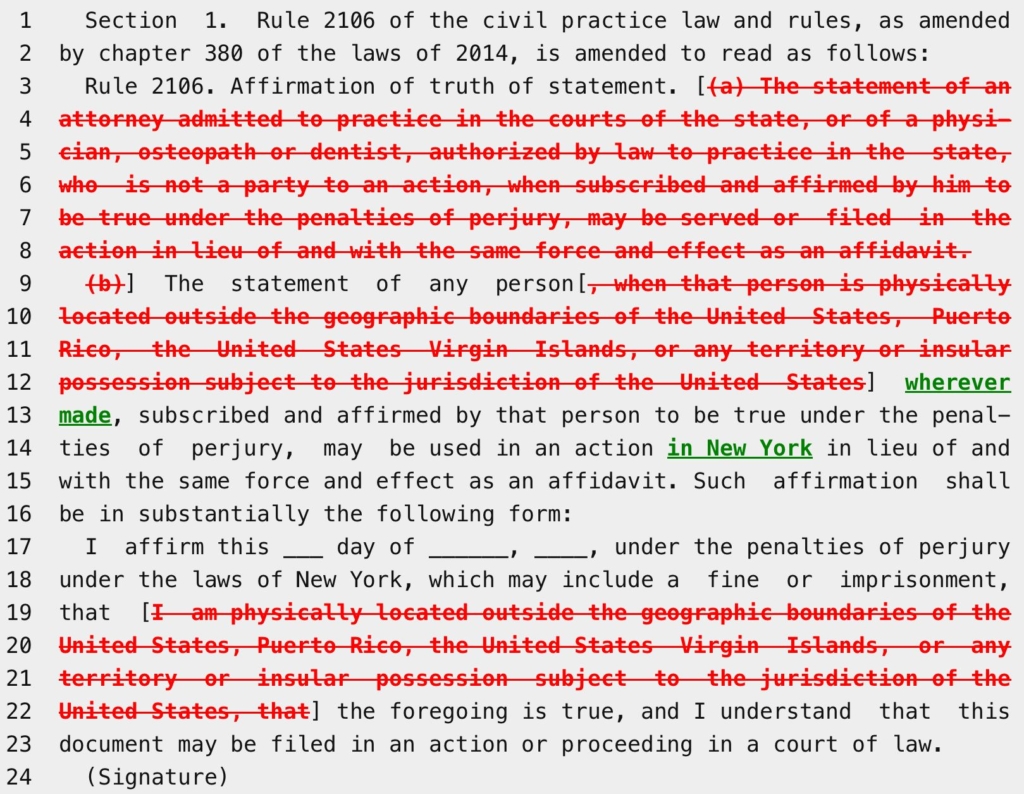Changes to New York CPLR Allowing Un-Notarized Affirmations From Any Witness Are Now in Effect
Effective January 1, 2024, notarized affidavits are no longer required for most sworn statements submitted in New York state court. No longer limited to lawyers and doctors, court-filed affirmations are now permissible from any witness. But there are also some muddied legislative waters behind this rule change, with some commentators suggesting that the Legislature may have unwittingly put into effect two separate versions of the same rule.
CPLR 2106, Then and Now
As of last year, New York Civil Practice Law & Rules (“CPLR”) section 2106 allowed a witness to submit an affirmation (an un-notarized sworn statement) only where the witness was signing the statement overseas, or was one of the following professionals: lawyers, physicians, osteopaths, and dentists. Other witnesses needed to submit sworn statements in the form of notarized affidavits.
A law signed by Governor Hochul in October 2023, with an effective date of January 1, 2024, amended the CPLR to allow affirmations from any person. This brings New York civil practice more in line with federal court practice, where un-notarized declarations have been in use for decades under 28 U.S.C. § 1746.
The amended CPLR 2106 reads as follows:
Section R2106 – [Effective 1/1/2024] Affirmation of truth of statement
The statement of any person wherever made, subscribed and affirmed by that person to be true under the penalties of perjury, may be used in an action in New York in lieu of and with the same force and effect as an affidavit. Such affirmation shall be in substantially the following form:
I affirm this ___ day of ______, ____, under the penalties of perjury under the laws of New York, which may include a fine or imprisonment, that the foregoing is true, and I understand that this document may be filed in an action or proceeding in a court of law.
(Signature)
The legislative redline reflecting the amendment is below.
Redline of CPLR 2106, amended from
New York State Assembly, Bill A05772.

Practical Considerations
It is worth noting that the amendment likely requires litigants to change how affirmations are styled, even for attorney affirmations. The prior version of CPLR 2106, subdivision (a) – previously limited to lawyers, doctors and dentists – did not require affirmations to include the exact “I affirm” text above. That language had been part of an otherwise now-eliminated subdivision (b), for witnesses signing affirmations outside the United States. The reference to a “fine or imprisonment” for perjury, or the entire clause that “I understand this document may be filed . . . [etc.] [etc.]” was not part of the typical pre-2024 attorney affirmation. Lawyers and law firms will presumably be updating their affirmations to include this language.
Another practical question will be whether and how quickly court personnel will become aware of the rule change. Certainly, when filing motions for emergency or ex parte relief, which are typically reviewed and approved by court staff as part of the filing process, there may be some risk that un-notarized affirmations from non-attorneys could be (erroneously) rejected.
A messier concern, although probably a lesser issue, is that there is some potential confusion in how CPLR 2106 was changed or, perhaps more aptly, inadvertently cloned.
“Separately Amended; Cannot Be Put Together”
It turns out that CPLR 2106 was amended in different ways, by two separate laws passed by the Legislature in parallel and signed by Governor Hochul. The above amendment was the product of a bill introduced in March 2023 (A05772 / S05162) and signed into law on October 25, 2023, with an effective date of January 1, 2024.
A separate law (A06065 / S02997), introduced in April 2023 by different sponsors, amended CPLR 2106 along different lines, without the “any person” language, merely extending the affirmation option to “all licensed healthcare practitioners.” This amendment was signed into law the same day, October 25, 2023, but effective immediately.
As the “any person” amendment had a later (1/1/24) effective date, most observers will likely treat this more expansive amendment as supplanting any prior versions. Thus, the online legal library Casetext.com treats the “any person” version of CPLR 2106 as the live version of the rule, listing the other version passed in October 2023 with the designation, “Effective Until 1/1/2024.”
But arguably there are two parallel versions of CPLR 2106 in effect today, and some who compile laws for a living have not picked a horse. As of the first week of 2024, McKinney’s, via Westlaw, lists both versions of CPLR 2106, one after the other. The New York State Senate likewise lists multiple versions of CPLR 2106, with a meme-worthy asterisk about its own handiwork: “Separately amended; cannot be put together.”
For peace of mind, none of this should invalidate the more expansive amendment to CPLR 2106, even if a different version exists, under the same section number. Co-existence seems plausible, however unintended. To be sure, most commenters on the amended CPLR 2106 have barely mentioned the potential conflict, simply announcing the good news without qualification that the new law permits anyone to opt for an affirmation.
So, although the legislative posture is not optimal, the law on the books is that un-notarized affirmations may be filed in New York state court cases by any witness, to the same effect as a notarized affidavit. Law firms may want to update their form affirmations, and maybe not throw away their notary seals just yet.
Changes to New York CPLR Allowing Un-Notarized Affirmations From Any Witness Are Now in Effect PDF